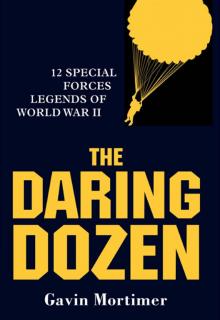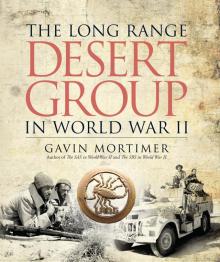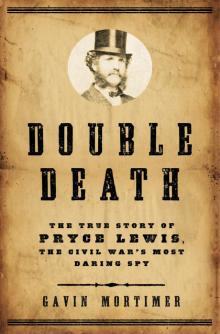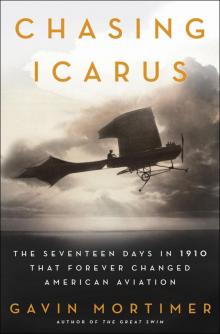- Home
- Gavin Mortimer
Double Death Page 30
Double Death Read online
Page 30
And yet despite Lewis’s obvious talent for military espionage (he had also brought back significant information from Tennessee during his attempt to discover the bank murderer), he was removed from the field by Pinkerton after his mission to Charleston and sent to Washington to guard the likes of Rose Greenhow and Eugenia Phillips, a task Lewis undertook with “much distaste.” It wasn’t that Lewis was singled out by Pinkerton for this thankless job; the agency’s payroll records show that between October 1861 and March 1862 only fourteen trips were made by his agents into Confederate lines, and half of those were undertaken by Webster and Hattie Lawton. It was a woeful misuse of resources, but it occurred because Pinkerton had become distracted by counterintelligence. Some of this work was important, and Pinkerton did arrest many genuine rebel informants, but a lot of it was pointless, such as the search of the Mortons’ home.
The answer to why Pinkerton turned away from positive intelligence to counterintelligence in the second half of 1861 lay in his canine devotion to General McClellan. When the general arrived in Washington at the end of July to take command of the Army of the Potomac, he summoned Pinkerton from Cincinnati and asked him to establish a secret service for his army with the emphasis being on rooting out enemies within the Union. In his eagerness to follow McClellan’s orders, Pinkerton lost sight of the bigger picture; he diverted the majority of his operatives to uncovering spies and sympathizers in Washington and Baltimore instead of dividing his resources between the two components of military espionage. News of arrests such as Rose Greenhow’s pleased McClellan, as they did the editors of Northern newspapers, but the general should have ordered Pinkerton to send one or more of his operatives to Manassas to determine the strength of General Johnston’s forces prior to the offensive that Lincoln was calling for.
That’s what an aggressive commander would have done, but McClellan had by this stage of the war already established his reputation as an apprehensive leader. It behooved Pinkerton to propose the idea, but the Scot didn’t. He and his men were too busy scrutinizing the movements of perfumed ladies, or worse. Pinkerton noted in his record book for the period some of the tasks that were given him by McClellan: the president of the Ohio Valley Bank demanded that Pinkerton put in a word on the bank’s behalf to Salmon Chase, the treasury secretary; an army board asked him to investigate a Chicago meatpacker, whose supply of beef to the army was mainly “skeletons and steers with thirteen wrinkles on their horns”; and on one day Pinkerton was asked to find out the time of a train leaving the capital.
The bald truth is that when he moved to Washington Pinkerton became as much a bureaucrat as a spymaster. He continued to receive the Richmond mail from Webster, but even that revealed little of importance; certainly not enough to warrant the risks Webster took each time he went South. In short, Webster’s espionage talents were never maximized by Pinkerton. He went on too many missions where the danger was greater than the information he brought back until eventually the Confederates suspected him. Pinkerton should have tasked Webster with collecting information on General Johnston’s forces at Manassas long before that last fateful trip to Richmond. Similarly, why in the fall of 1861 didn’t Pryce Lewis adopt once more the guise of the English cotton mill owner and head to Alabama or South Carolina? No one would have recognized him from his trip to western Virginia. The reason is that Pinkerton didn’t possess the brain of a military espionage chief, and in the fall of 1861 he was too preoccupied with pleasing General McClellan.
Nevertheless, despite his six frustrating months in Washington, Pryce Lewis was one of the most successful spies of the Civil War, and he was certainly the most unsung. Greenhow immortalized herself in her book, as Belle Boyd did in her memoirs, and Lafayette Baker in his. In his own account of the war Pinkerton tooted Webster’s horn nearly as loudly as his own. But no one lauded the achievements of Pryce Lewis.
N O T E S
Prologue: “There Goes a Big Slide of Snow”
3 Although several newspapers covered Lewis’s death, the three most comprehensive accounts—and the ones on which I base his final hours—were published by the New York Times of December 7, 1911, the New York World, December 10, 1911, and Harper’s Weekly, January 30, 1912.
Chapter One: “Little Molehills from the Green Sea”
8 “As the ship is towed out”: Illustrated London News, July 6, 1850.
8 “The laboring of the ship”: Charles Dickens, American Notes for General Circulation (London: Chapman and Hall, 1842), 23.
Chapter Two: “A Detective! Me?”
13 “A detective! Me?”: Pryce Lewis memoirs, xi, Pryce Lewis Collection, St. Lawrence University Library. Hereinafter referred to as PLM.
13 “earnestness, enthusiasm, heartiness”: The report of the “Phrenological Description” of Allan Pinkerton, made by Professor O. S. Fowler on Thursday, December 14, 1865, is contained in the Pinkerton Papers, Library of Congress, Washington, D.C.
16 “got to sort of hanging around her”: James Mackay, Allan Pinkerton: The Eye Who Never Slept (Mainstream, 1996), 49.
16 “had become an outlaw”: James D. Horan, The Pinkertons: The Detective Dynasty That Made History (Crown, 1967), 10.
Chapter Three: “Murdered in the Most Shocking Manner”
17 “praised Lewis’s appearance”: PLM, xi.
17 “with a good salary”: Ibid.
19 The crime had riveted the Southern states: Maroney was found guilty in June 1860 and sentenced to ten years’ hard labor. The role of the Pinkerton agency in securing a conviction led to the expansion of its operations on the East Coast (the headquarters of the Adams Express was in New York) as more and more companies called upon its services.
19 “high and honorable calling”: James D. Horan, The Pinkertons: The Detective Dynasty That Made History (Crown, 1967), 30.
19 “It cannot be too strongly impressed”: Kevin Kenny, Making Sense of the Molly Maguires (Oxford University Press, 1998), 154.
20 Many of the men: The only member of the agency who had been attacked was Pinkerton himself in 1853. A report appeared in the Chicago Daily Press describing how a gunman had fired “two slugs [which] shattered the bone five inches from the wrist and passed along the bone to the elbow where they were cut out by a surgeon.” In the years that followed, Pinkerton never alluded to the outrage, nor did he appear to have suffered any lasting damage from the wound, which is curious considering its severity and the primitive nature of frontier medicine at the time. In 1868 another attempt was made on his life, but the “gunman” revealed later that it was all a publicity stunt concocted by Pinkerton, who was “rather fond of sensations.” The 1853 attempt on Pinkerton’s life certainly brought his new business some publicity, but did it actually take place, or had Pinkerton planted the story with the newspaper in return for subsequent scoops?
20 “an out-and-out Abolitionist”: PLM, 2.
20 “in the vigor of early manhood”: Ibid., xi.
20 “Procure it, and read it”: Ibid., 1.
21 “had come to regard him as a man of original”: Ibid.
21 “fascinated by the descriptive analysis”: Ibid.
22 “murdered in the most shocking manner”: New York Times, February 14, 1859.
22 “Two or three leaves”: Ibid., 1.
22 “and stopped at the principal hotel”: PLM, 2.
22 “He reviews the life of the man”: Letter from G. H. Bangs to Pryce Lewis, Pryce Lewis Collection, St. Lawrence University Library.
23 “fire-eating Southerners boasted”: PLM, 2.
23 “he readily fell in with the ways”: Ibid.
Chapter Four: “A Plan Had Been Laid for My Assassination”
25 Which left only Abraham Lincoln: The nickname rail-splitter was born during a political rally in 1860 when one of Lincoln’s managers showed a crowd a pair of fence rails that his master had reputedly split as a young man, proof that here was a politician who personified the Republican belief that America was a land of opportunity for anyone
who worked hard.
25 “From early morning voting”: Quoted in Catherine Cooper Hopley, Life in the South from the Commencement of the War (Chapman and Hall, 1863).
26 “there is nothing in all the dark caves”: Times (London), May 28, 1861.
27 “A lady’s thimble will hold all”: James M. McPherson, Battle Cry of Freedom (Penguin, 1990), 238.
27 “detested slavery … this institution of human bondage”: Allan Pinkerton, The Spy of the Rebellion (M. A. Winter and Hatch, 1883), 25.
28 “mute and motionless”: Harper’s Weekly, December 10, 1889.
28 “had it not been for the excessive watchfulness”: Pinkerton, The Spy of the Rebellion, 26.
29 “worm out secrets in many places”: Pinkerton, The Spy of the Rebellion.
29 “Her complexion was fresh and rosy”: Ibid., 367.
31 “the simple inventions of those who are agents”: Edward Stanley Lanis, “Allan Pinkerton and the Baltimore ‘Assassination’ Plot against Lincoln,” Maryland Historical Magazine (March 1950).
31 “[Pinkerton] informed me that a plan had been laid for my assassination”: Benson J. Lossing, Pictorial History of the Civil War in the United States of America (G. W Childs, 1866).
32 “the solicitations of a professional spy”: Ward H. Lamon, The Life of Abraham Lincoln from His Birth to His Inauguration as President (J. R Osgood, 1872).
32 “not believe the Presidency can ever”: Baltimore Sun, February 26, 1861.
32 “a gentleman of Vidocquean repute”: Eugène François Vidocq was a French criminal turned private detective in the early nineteenth century, the inspiration for Jean Valjean in Victor Hugo’s Les Misérables.
Chapter Five: “Set a Price on Every Rebel Head and Hang Them”
33 “After the closest observation”: PLM, 3.
34 “in a fever of preparation for war”: Ibid., 2.
34 He received little help from his cabinet: Seward’s deviousness in regard to Fort Sumter is best described by James M. McPherson in Battle Cry of Freedom (Penguin, 1990), 268–69.
35 “must be trampled under foot”: New York Times, April 13, 1861.
35 “convulsion seized the public mind”: Quoted in Catherine Cooper Hopley, Life in the South from the Commencement of the War (Chapman and Hall, 1863).
36 “that the country will have to pass through”: McPherson, Battle Cry of Freedom, 281.
36 “be of any service in the way of obtaining information”: Allan Pinkerton, The Spy of the Rebellion (M. A. Winter and Hatch, 1883), 138.
36 “filled with soldiers, armed and eager for the fray”: Ibid., 137.
37 “had for some time entertained the idea”: Ibid., 139.
37 “as fully and concisely”: Ibid.
Chapter Six: “An English Nobleman Travelling for Pleasure”
39 “great excitement among the people”: PLM, 3.
40 “consists in suspending the offender by a rope”: Richmond Dispatch, May 20, 1861.
40 “the character of an English nobleman”: Allan Pinkerton, The Spy of the Rebellion (M. A. Winter and Hatch, 1883), 210.
40 “would thus escape a close scrutiny”: Ibid.
41 “and a pair of strong gray horses”: Ibid.
42 “a handsome segar case”: PLM, 8.
43 “carefully destroyed the papers”: Ibid., 18.
44 ulcers, sores, swelling stiffness: In Life at the Springs of Western Virginia, by Mary Hagner, written in 1839, she reported that the springs were popular with people suffering “hemorrhoidal [sic] affections, jaundice … long standing dysentery and chronic syphilitic diseases.”
45 “a gentlemanly fellow”: The encounter with the rebel patrol, and Lewis’s interview with George Patton, are described in PLM, 8–13.
48 Then he went on to regale Patton: The storm in November 1854 sent thirty—and not fourteen—British transport ships to the bottom of Balaclava Harbor.
Chapter Seven: “Don’t You Know There Is a War in This Country, Sir?”
50 “Charleston is quite a pretty place”: Gallipolis Dispatch, August 8, 1861.
51 “Men of Virginia! Men of Kanawha!”: Granville Davisson Hall, Lee’s Invasion of Northwest Virginia in 1861 (Mayer and Miller, 1911).
52 “blown down over your head”: The confrontation between Mrs. Littlepage and General Wise was gleaned from a 1984 application to have the farmhouse included in the National Register of Historic Places. A copy of the application form can be viewed at the West Virginia Division of Culture and History Web site, www.wvculture.org/.
52 “whip the world”: Roy Bird Cook, “The Civil War Comes to Charleston,” West Virginia History Journal 23, no. 2 (January 1962).
52 “sky was clear, the air inspiriting”: PLM, 14.
53 “rough-looking men, mountaineers in woolen shirts”: Cook, “The Civil War Comes to Charleston.”
54 “thin and below the average size”: PLM, 16.
55 “I would like to speak to your Excellency”: Lewis described his heated exchange with General Wise in ibid., 16–17.
56 “Let’s leave everything behind us”: Ibid., 17.
56 “was traveling as an inoffensive tourist”: Ibid.
56 “if the consul should be suspicious”: Ibid., 19.
57 “incipient insanity”; “a more bracing climate”: Letter from Consul George Moore to the British Foreign Office, June 11, 1861, document no. FO5/786, National Archives, Kew, UK.
57 “Mr. Cridland begged me to be seated”: Catherine Cooper Hopley, Life in the South from the Commencement of the War (Chapman and Hall, 1863).
57 “I have waited so long for an opportunity”: Ibid.
58 “Look at the paper I am obliged to use!”: Ibid.
Chapter Eight: “Grossly Insulting to Some of the Officers”
59 “the grass of the soil we are defending is full”: Dispatch from Wise to General Cooper, July 17, 1861, reproduced in The War of the Rebellion: A Compilation of the Official Records of the Union and Confederate Armies (Government Printing Office, 1880–1901).
59 “copperhead traitors”: James M. McPherson in his excellent Battle Cry of Freedom (Penguin, 1990) writes: “Ohio Republicans seem to have used it [the term copperhead] as early as the fall of 1861 to liken antiwar Democrats to the venomous snake of that time. By the fall of 1862 the term had gained wide usage and was often applied by Republicans to the whole Democratic party.” (494) However, in a dispatch sent by Wise from Charleston on July 17, 1861, to General Samuel Cooper, he refers to Kanawha being “full of copperhead traitors,” indicating that the insult was already in use, at least by Wise.
59 “a spy is on every hill top”: Dispatch from Wise to General Cooper, July 17, 1861.
60 the right protector to have: The meeting between Lewis and the two rebel officers is described in PLM, 20–21.
61 “more impressed by the exalted position”: Ibid., 22.
61 “always careful to avoid details”: Ibid., 23.
61 “compared notes and planned modes of escape”: Ibid.
62 “cutting chutes through the river’s shoals”: Ken Sullivan, ed., The West Virginia Encyclopedia (West Virginia Humanities Council, 2006), 393.
62 “the rebels have sunk two boats laden with stone”: James D. Horan, The Pinkertons: The Detective Dynasty That Made History (Crown, 1967), 66.
63 “grossly insulting to some of the officers”: PLM, 24.
63 “passed a miserable day reviewing every plan”: Ibid., 25.
64 “heard some one ascending the stairs”: Ibid.
64 “The Yankees will give him hell!”: Ibid.
65 Since the initial order from McClellan: In William Cochran’s biography of Jacob Cox, written in 1901, the author said that McClellan’s dispersal of Cox’s meager force showed that either he “had unbounded confidence in General Cox, or he designed that he should be defeated in order to add luster to his own achievements.” (23)
66 “drive Wise out and catch him”: Charles Preston Poland, The Glories o
f War: Small Battle and Early Heroes of 1861 (Authorhouse, 2004), 337.
Chapter Nine: “I See You Are a Stranger in These Parts”
67 “a fine-looking, middle-aged man”: PLM, 26.
68 a total of $35.75: Lewis retained the bill for his stay at the Kanawha House Hotel, and it is among his papers of the Pryce Lewis Collection at St. Lawrence University Library.
68 “a rough road through a hilly country”: PLM, 28.
68 the village of Logan Courthouse: Logan Courthouse was named after James Logan, secretary of the province of Pennsylvania in the eighteenth century, although in 1852 Mayor Thomas Dunn English decreed that the village would be renamed in honor of Aracoma, daughter of a famous Indian chieftain. The name failed to catch on, however, and to most it remained Logan Courthouse. In 1907 it underwent its final name change, becoming Logan.
69 “most of whom were rough-looking soldiers”: Lewis’s overnight stop in Logan Courthouse is described in PLM, 29–35.
70 “had prohibited the slave-trade, and did not mean to revive it”: Ephraim Douglass Adams, Great Britain and the American Civil War (Russell and Russell, 1924), 55.
71 “Finality John”: Ibid.
71 “I will not stop to depict”: www.civilwarinteractive.com.
72 “cotton would bring England to her knees”: Charleston Mercury, June 4, 1861.
74 “England is bound to have the cotton in the south”: PLM, 31.
74 Queen Victoria had issued a proclamation against any of her subjects: Ibid., 33.
75 “went over England’s history”: Ibid., 34.
76 “we had been gone only nineteen days”: Ibid., 36.
Chapter Ten: “Do You Mean to Say That You Have Been in Wise’s Camp?”
77 “six feet in height, very erect”: William C. Cochran, General Jacob Dolson Cox: Early Life and Service (Bibwotheca Sacra, 1900), 18.
78 “he might see over the banks of the stream”: Charles Preston Poland, The Glories of War: Small Battle and Early Heroes of 1861 (Authorhouse, 2004), 338.

 The Daring Dozen
The Daring Dozen The Long Range Desert Group in World War II
The Long Range Desert Group in World War II Double Death
Double Death Chasing Icarus
Chasing Icarus